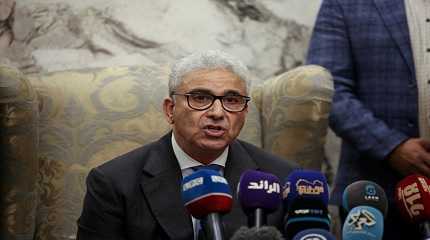
BENGHAZI, Libya, March 1 (Reuters) - Libya's parliament approved a new government on Tuesday despite the incumbent administration vowing not to cede power, pushing a fragile peace process to the brink of collapse and raising the risk of new fighting or territorial partition.
Lawmakers' declaration of Fathi Bashagha as prime minister after a televised vote aggravates a power struggle with the interim administration of Abdulhamid al-Dbeibah, who was installed through a U.N.-backed process last year.
Opposing armed groups have mobilised in the capital Tripoli over recent weeks and foreign forces that have backed rival warring factions remain embedded in the North African country.
Whether the political crisis will kindle armed conflict remains unclear, but it leaves Libya without a unified government, with the main political and military forces bitterly divided and with no clear path forward.
Any move by Bashagha to establish a government in Tripoli could well trigger armed resistance by forces linked to Dbeibah, pointing to a return to Libya's division between rival administrations based in different cities.
With Khalifa Haftar's Libyan National Army (LNA) that backs the parliament in control of most major oil facilities, it also raises the prospect of another blockade of the country's 1.3-million-barrels-per-day crude exports.
During the previous years of division both the central bank and National Oil Corp were linked to the internationally recognised Tripoli government but operated across front lines. The central bank governor is seen as an ally of Dbeibah.
"The most likely option is a return to two governments, neither of which will have all that much legitimacy, but only one of which will control the central bank," said Tarek Megerisi of the European Council on Foreign Relations.
Bashagha's large cabinet with 35 members reflects the extensive negotiations and promises of positions needed to secure support from a majority of members of parliament and the various interests they represent.
A vote had originally been scheduled for Monday, but lawmakers were unable until Tuesday to agree upon Bashagha's cabinet list.
Parliament Speaker Aguila Saleh said the new government was approved by 92 of the 101 members present in the chamber on Tuesday. That compares to the 132 members that backed Dbeibah's interim unity government in a special session a year ago.
DISPUTES
Libya has enjoyed little peace or security since the 2011 NATO-backed uprising against Muammar Gaddafi and it was divided after 2014 between warring parallel administrations in the east and west.
The United Nations backed a ceasefire and peace process after an eastern offensive against Tripoli collapsed in 2020, with most sides in Libya publicly supporting Dbeibah's interim unity government and scheduling elections for December 2021.
After the election was cancelled shortly before the vote was due to take place amid disputes over the rules, the parliament moved to seize control of the political process and replace Dbeibah's government.
The parliament, which was elected in 2014 and mostly took the eastern side in the civil war, has declared that Dbeibah's government expired when the election did not take place.
Critics of the parliament, including Dbeibah, accuse it of having sabotaged the December election and of working to ensure it can remain in place indefinitely, charges it denies.
The United Nations and foreign powers that recognised Dbeibah's government when it was installed a year ago have avoided any definitive statement on which administration should now be seen as legitimate, and have instead pushed for quick elections.
Dbeibah has promised elections in June while the parliament has set a roadmap targeting a referendum on a temporary constitution followed by a national vote next year, but analysts say it is hard to envisage either event taking place.




